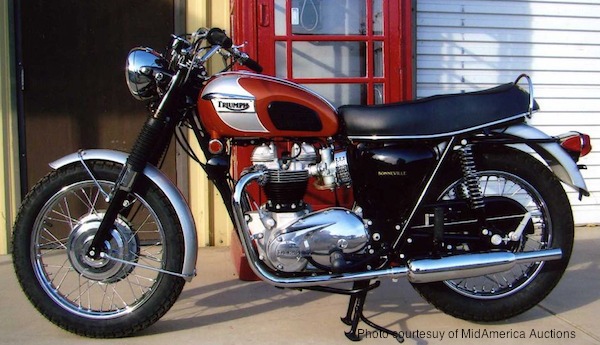COMPETITION FROM ABROAD
The 1969 Triumph Bonneville had its work cut out for it. It seemed like the Triumph Bonneville was getting faster every year, and good thing too, with new arrivals from Japan like the 1969 Honda 750/Four & the Kawasaki 500 triple. The merry men at Meriden found a few more horses hiding in the venerable vertical twin yet again. These were the Golden Years for the Triumph Bonneville and Triumph motorcycles in general, the last time they would be considered a world-class performance motorcycle. When compared to the increasingly technologically-superior, better built, and cheaper bikes from Honda, Yamaha, Kawasaki and Suzuki, the Triumph Bonneville looked outdated and outclassed. The end was near, but no one knew it yet. The Model designations were as before, T120R the road version with down pipes; T120C, the off-road/street scrambler with high pipes. The 1969 model year began with Engine #DU85904.

1969 TRIUMPH BONNEVILLE ENGINE
Starting with Engine #DU86965, the engine numbers were stamped over a series of embossed Triumph logos on the number plate at the base of the cylinder block, on the drive side (left side). Inside the engine, the cams were now nitrate-hardened (marked with an “N”) that solved earlier wear problems. Starting with Engine #DU85904 new revised Hepolite pistons with s domed crowns & strengthened gudgeon pins (wrist pins) & from Engine #GC23016, new conrods with self-locking cap nuts were used. In yet another attempt to solve the vibration problem, weight removed from the flywheel in 1968 was put back on, while retaining the 85% balance factor, starting with Engine #NC02256.
Numerous smaller changes were made to the pushrod tubes, the oil pump and the continuing conversion over to Unified threads (American) from British Standard (Whitworth). The twin 30mm Amal Concentric carbs, now rubber-mounted, lost their separate pilot jets, relying instead on a fixed internal drilling. Main jets went from 210 to 190 and needle jets from 0.107 to 0.106. The transmission was almost completely reworked and beefed-up, in stages: new shift mechanism, extra hardening of the gears, ‘shaving the gears’, larger main- & layshafts. Starting with Engine #DU88383, the clutch baskets were statically balanced.

1969 TRIUMPH BONNEVILLE FRAME & RUNNING GEAR
The frame remained virtually unchanged for 1969, but the fork yokes (triple clamps) were made 1/4′ wider to allow for wider front times. The new-for-’68 8″ SLS front brake needed some work, including the rerouting of the cable.
The seat now had a quilted top of a breathable fabric & thicker padding. The “eyebrow” tank emblem was replaced with a simpler one. Colors for 1970 were Olympic Flame (a deep reddish-orange) & Silver, with the usual pattern on UK/Exports, and a new paint scheme on US bikes, where the Silver on the tank was shaped into a flash, below the tank emblem and in front of the knee pads. The steel fenders were now painted Silver with an Olympic Flame stripe down the center. Some US machines had this reversed. Gold pinstriping separated the two colors. The gold “Bonneville” transfers on the black oil tank & left side cover were now in block letters, instead of the traditional script.

1969 Triumph Bonneville SPECIFICATIONS
|
Bonneville T120R Bonneville T120C Engine type Displacement Bore & Stroke Compression Carburetors Ignition Engine output Primary drive Primary drive sprockets Clutch Gearbox Ratios, overall: 1st, bottom 2nd 3rd 4th, top Final drive Final drive sprockets Frame type Suspension, front Suspension, rear Brake, front Brake, rear Tire, front Tire, rear Fuel Capacity Wheelbase Seat height Ground clearance Weight, unladen |
Roadster, low pipes Street Scrambler, high pipes Air-cooled OHV vertical twin 649cc / 40.0 ci 71mm X 82mm / 2.79″ X 3.23″ 9.0:1 2- Amal Concentric 30mm Battery & coil, Lucas 49 bhp @ 6200 3/8″ triplex chain X 84 links 29T X 58T Multi-plate, wet 4-speed constant-mesh, right-foot shift 11.8:1 8.17 6.76 5.84 5/8″ X .400″ X 3/8″ chain X 106 links 19T X 47T Brazed lug, full-cradle, single downtube Telescopic fork, hydraulic damping Swing arm, 2 Girling dampers 8″ TLS drum, full width 7″ SLS drum 3.25″ X 19″ Dunlop 4.00″ X 18″ Dunlop 2.5 Imp gal (US) / 4 Imp gal (UK & export) 54.5″ / 140.3cm 32.5″ / 77.5cm 5.0″ / 12.7cm 363 lbs / 165 kg |


